|
|
|
Sort Order |
|
|
|
Items / Page
|
|
|
|
|
|
|
| Srl | Item |
| 1 |
ID:
172149


|
|
|
|
|
| Summary/Abstract |
The article seeks to document the changing patterns in football fandom over the past three decades, since the advent of the so-called era of globalisation, using the case study of Israel. It shows how, in line with global trends, Israeli fans moved from passive following of sport clubs identified with political parties to becoming active supporters with growing involvement in the clubs’ management. The article also traces the shift from party politics to patterns of nationalism and ethnocentrism amongst sport fans. Finally, it shows how Israelis moved from fandom of local clubs to that of foreign clubs, mirroring a similar trend in other countries.
|
|
|
|
|
|
|
|
|
|
|
|
|
|
|
|
| 2 |
ID:
089759
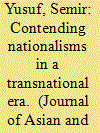

|
|
|
|
|
| Publication |
2009.
|
| Summary/Abstract |
Embarking on an outlook pertinent to the state of social fields in a global era, this article demonstrates the validity of the insight that rejects any strict bifurcation between localizing and globalizing tendencies in the maintenance of social life-worlds. By employing an appropriate term for the `transgressive' nature of nationalistic imaginations and actions, `transnationalism', it delves into qualitatively, but briefly analyzing the current status and futurity of, and the nature of the relationship that exists between, Ethiopianist and Oromo (a specific brand) nationalisms. The result is that neither of the two nationalisms seems to vanish amid the `network society' of the new global era, nor, by implication, is the contention between them likely to recede (until and unless they undergo significant, internal qualitative transformations).
|
|
|
|
|
|
|
|
|
|
|
|
|
|
|
|
| 3 |
ID:
137224
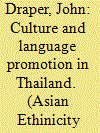

|
|
|
|
|
| Summary/Abstract |
This article examines the introduction of multilingual Thai/Thai Lao/English signage in commercial areas of the Faculty of Humanities and Social Sciences at Khon Kaen University, the principal tertiary university for the 19 million citizens of Northeast Thailand, the majority of whom are of the minority ‘Thai Lao’ ethnicity, an ideological construction that is presented in some detail. This introduction of signage followed a previous study to introduce officially sanctioned multilingual direction-giving signage, including the main faculty sign, in three prominent areas of the Faculty. The survey employed a complex methodology to survey the opinions of 300 students together with observation of students and interviews with members of the faculty. The research type is therefore a mixed-methodology investigation of identity and language policy planning, cultural promotion, glocalization, Gal and Irvine’s semiotic ideology structuration process, the (urban) linguistic landscape and Bourdieu’s theories of social reality. The study found high levels of support for the signage from the student body, members of the faculty and the stallholders themselves.
|
|
|
|
|
|
|
|
|
|
|
|
|
|
|
|
| 4 |
ID:
153646
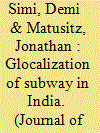

|
|
|
|
|
| Summary/Abstract |
This paper examines how Subway, the US fast food restaurant franchise, has adapted to Indian culture. Glocalization theory will be the guiding framework used in this analysis. Glocalization rests on the premise that a universal concept must change to fit and function in a local culture. Blending the local and the global, it provides a passage to empowerment where modifications to a particular commodity can make it prosper in various traditions. Four important themes of glocalization emerged from this analysis: (1) adjustment of restaurant ambience; (2) adoption of Jain values; (3) adjustment of advertising practices; and (4) adjustment of the use of social media. An important conclusion is that, although India is embracing modernity, Subway has honoured many religious and cultural views in that nation.
|
|
|
|
|
|
|
|
|
|
|
|
|
|
|
|
| 5 |
ID:
104698
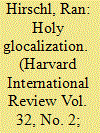

|
|
|
| 6 |
ID:
120361


|
|
|
|
|
| Publication |
2013.
|
| Summary/Abstract |
This article examines the musical repertoire broadcast on Israeli state radio stations on Remembrance Day. Commencing with the first Remembrance Day, Israeli radio stations have refrained from broadcasting songs that do not contribute to the glorification of the military mythology or failure to reinforce the consensual perception of national loss. In view of globalization - it might be assumed that Remembrance Day songs would undergo changes in tune with the times. From a musical point of view, new songs that belong to what Regev and Seroussi classify as 'globalizing Israel' penetrated into the nationalist arena. But, following Inglehart and Baker, these songs, despite their seemingly secular façade, remain limited hegemonic enclosures organized around the core of founding values. Apparently, this is an example of the process of glocalization of culture. The article seeks answers to the strategies employed to accommodate these new songs to the traditional ideology of the classical Remembrance Day songs and examines whether the mechanisms of legitimacy that enable the inclusion of new voices on Remembrance Day, can be identified. We argue that their choice is not arbitrary and that they illustrate the manner by which voluntary cultural entrepreneurs (musical editors) are co-opted in the postnational condition.
|
|
|
|
|
|
|
|
|
|
|
|
|
|
|
|
| 7 |
ID:
099765
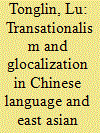

|
|
|
|
|
|
|
|